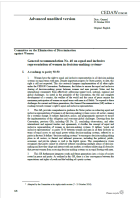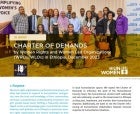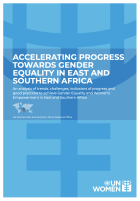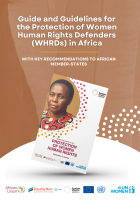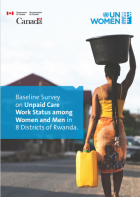1 - 11 of 11 Results
Date:
This study provides an overview of the kinds of administrative data on discrimination and inequality currently being produced in 22 countries across Africa. It also identifies the data and capacity gaps as well as other barriers that prevent this kind of data from being used for statistical purposes. The recommendations of the study are aimed at helping producers and users of administrative data and statistics on discrimination and inequality improve the availability and accessibility of quality data. This can be done by for example improving data governance and statistical coordination, amongst other interventions. Increased accessibility and regular publication of this data will also contribute towards greater uptake and use and ultimately more informed decision making and better monitoring of discrimination and inequality on the continent.
Date:
Women have the right to equal and inclusive representation in all decision-making systems on equal terms with men. Despite important progress by States parties, to date, this right is still not respected. This General Recommendation (GR) outlines a roadmap towards women’s right to equal and inclusive representation. It provides comprehensive guidance for States parties on achieving equal and inclusive representation of women in all decision-making systems across all sectors, aiming for a systemic change.
Date:
Prioritizing Women's Peace and Security to achieve Gender Equality.
Date:
The purpose of this Charter of Demand is to provide a tool for women led and women’s rights organizations to make their voices and demands heard.
Date:
This Regional Coordination Strategy articulates how UN Women will leverage its unique triple mandate—encompassing normative support, UN system coordination, and operational activities—to mobilize urgent and sustained action to achieve gender equality and the empowerment of all women and girls and support the achievement of the 2030 Agenda.
Date:
The Report highlights the imperative and urgent need to have men, along with women, become gender equality activists and work towards violence-free, inclusive societies. An important reflection on masculinity sheds light on how toxic masculinity models not only harm women and girls, but the majority of men and boys too. In this regard, gender equality really matters for both men and women, and requires both to join their efforts to realize it.
Date:
The "Guide and Guidelines on the Protection of Women Human Rights in Africa" is a resource that sets out the legal and policy framework that guarantees the rights of women human rights defenders in Africa and establishes obligations to respect, promote and fulfil these rights by African Member-States.
Date:
The baseline survey on unpaid care work status among women and men in eight districts of Rwanda seeks to understand the care-related dynamics in households, this study utilized both quantitative and qualitative research methodologies. Drawing on Oxfam’s Household Care Survey (HCS) and the Harvard Analytical Framework (also referred to as the Gender Roles Framework). The survey helps to understand how women, men and children spend their time, how care activities are distributed in the household and the access that households have to basic public services and infrastructure that facilitate their everyday survival. The study also explored the social norms that shape power relations and gender division of care labor.
Date:
UN Women amplified women’s role in the COVID-19 response highlighting the significant leadership roles women played in leading the response efforts in materials on COVID-19 prevention disseminated in local languages and hand washing facilities were constructed in 6 elementary schools. 528 returnee migrant women workers from the Middle East and domestic workers across Addis Ababa have been provided with basic sanitation and hygiene training and raising awareness on the disproportionate impact of COVID-19 on women, girls, and vulnerable and marginalized groups.
Date:
The review indicated that Ethiopia has not only ratified many of the conventions and treaties related to refugees and asylum seekers, but also formalized these laws into its Constitution and in the national Refugee Proclamation. However, a closer analysis of the health sector focusing on sexual, reproductive, maternal, newborn, child and adolescent health (SRMNCAH) services to women and girls in the humanitarian settings, the laws, policies, strategies, guidelines, programs, and plans of the sector indicated a clear gap.
Date:
The ongoing crisis in Nigeria's North East region, compounded by the onset of the COVID-19 pandemic has left internally displaced persons even more vulnerable. 54% of the internal displaed population is female. The Rapid Gender Assessment undertaken by UN Women in collaboration with CARE International and Oxfam examines the gender-related impact of COVID-19 on women, men, girls and boys to inform the intervention response for the North-East.


